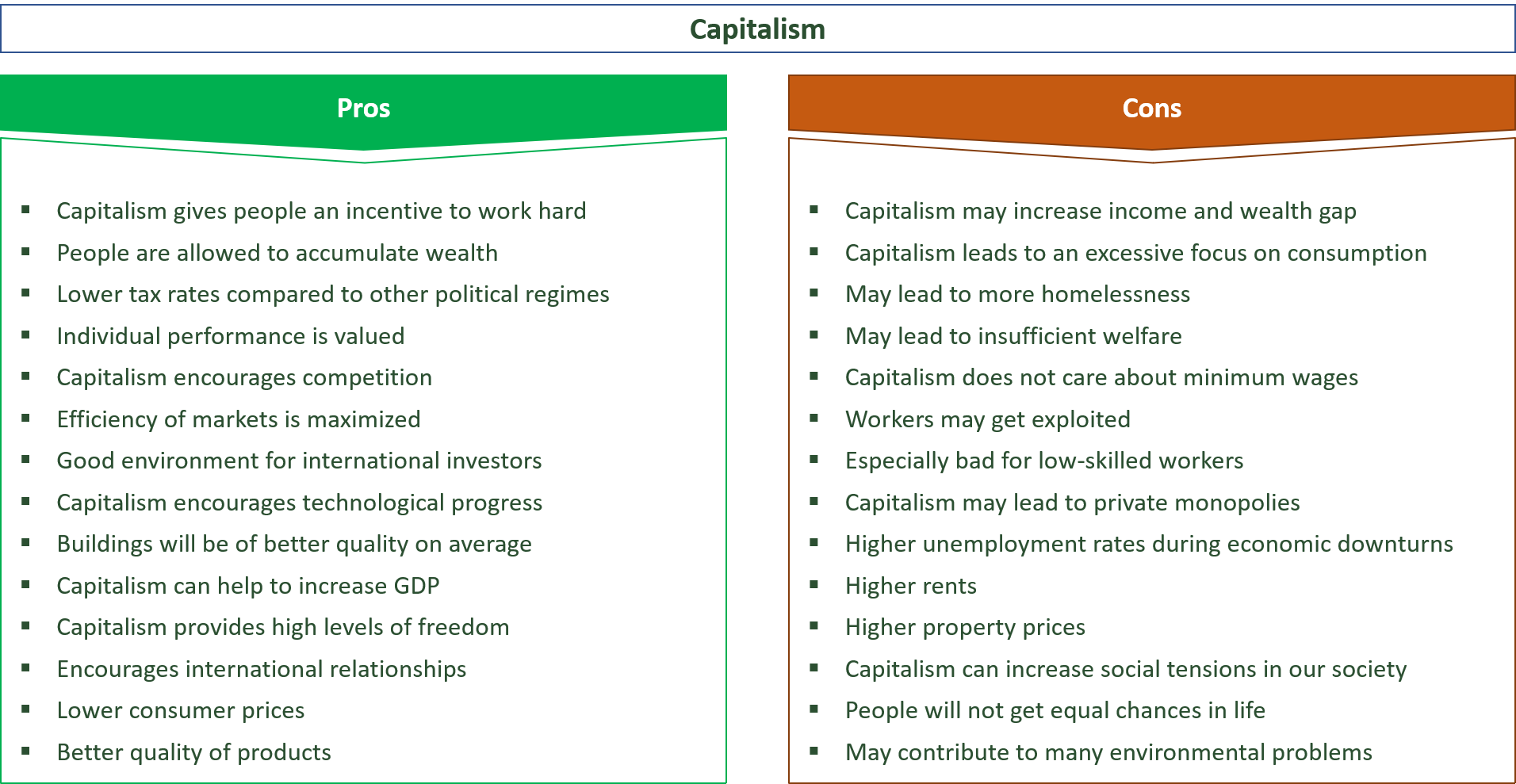“Doing well is the result of doing good. That’s what capitalism is all about.”
Ralph Waldo Emerson, Poet
Advantages & Disadvantages of Capitalism

The system of capitalism is present in many countries all over the world.
Capitalism is an economic concept where means of production are in private hands and so is the profit of these operations.
In capitalist countries, contrary to socialism and communism, people are actually allowed to accumulate high levels of wealth.
While there are many advantages to the political system of capitalism, there are still some downsides related to this concept.
In this article, the pros and cons of capitalism are discussed.
Audio Lesson
Contents
Advantages of Capitalism
- Capitalism gives people an incentive to work hard
- People are allowed to accumulate wealth
- Lower tax rates compared to other political regimes
- Individual performance is valued
- Capitalism encourages competition
- Efficiency of markets is maximized
- Good environment for international investors
- Capitalism encourages technological progress
- Buildings will be of better quality on average
- Capitalism can help to increase GDP
- Capitalism provides high levels of freedom
- Encourages international relationships
- Lower consumer prices
- Better quality of products
- Bigger variety of products
Capitalism gives people an incentive to work hard
One major advantage of capitalism is that it gives people the incentive to work really hard.
This is due to the fact that people are allowed to keep a high fraction of their income and can buy many things they want from it.
In capitalist countries, people are also allowed to invest their money in various different ways.
Hence, the incentive to work hard is quite present in capitalist countries since people know that they can greatly benefit from their hard work.
People are allowed to accumulate wealth
People in capitalist countries are also allowed to accumulate significant amounts of wealth.
The accumulation of wealth is generally a good thing since it provides people with a financial cushion for difficult financial periods that might come in the future.
Thus, through the accumulation of wealth in good times, people will not have to rely on government support in bad financial times.
Therefore, people are also more responsible for themselves in a capitalist system and know that they have to take care of themselves in order to succeed in life.
Moreover, since people are able to accumulate wealth, they will also be quite motivated to work long hours, which in turn can lead to higher productivity of workers and to higher output levels in general.
Lower tax rates compared to other political regimes
Another benefit of capitalism is that capitalist countries often have lower tax rates compared to socialist countries.
This is due to the fact that there will be a lower level of redistribution in capitalism compared to socialism.
In turn, governments have to tax people less and a higher fraction of the overall income will benefit the people who actually worked hard for it.
Lower tax rates also lead to a higher motivation to work since a higher fraction of the income will actually benefit workers instead of being redistributed.
Additionally, lower tax rates also imply fewer market distortions since market forces can work in a more efficient manner.
Individual performance is valued
People in capitalist countries often also feel that individual performance is still important and that they should really take efforts to work hard and to make their day as productive as possible.
In contrast, in socialist countries, people often have a much lower incentive to improve their individual performance since they feel that their performance doesn’t really matter since a high fraction of their income will be deducted for tax purposes anyway.
Hence, capitalism can also help in the sense that people feel that individual performance pays off in the long run, which is crucial to keep people in our society motivated in the long run.
Capitalism encourages competition
Capitalism can also increase the level of competition in an economy.
While this might be rather bad for some companies since they may have to go out of business, a higher level of competition among firms is usually quite good for the general public.
With a high level of competition, firms have to really optimize their processes and have to provide customers with the best experience possible in order to stay competitive in the long run.
Consequently, capitalism can also help to increase the pressure on firms to optimize their processes and to adapt to the latest technologies in order to provide the best customer experience.
Efficiency of markets is maximized
Since capitalism also aims to minimize market frictions in an economy, it also helps to make local markets as efficient as possible.
In fact, research has shown that free markets work best in terms of efficiency and every friction in the market causes a certain level of efficiency loss.
Hence, since tax rates are usually rather low in capitalist countries and also several other frictions are kept to a minimum, chances are that market forces will be able to work properly and that the overall welfare in a capitalist economy can be optimized over time.
Good environment for international investors
Capitalism can not only have its benefits for the general public, it can also be a quite good environment for international investors.
In fact, international investors will often be much more willing to invest their money in capitalist instead of social countries since they will not have to fear to get expropriated in the long run.
Moreover, in capitalist countries, investors often also have to pay rather low taxes and therefore, their investments will be more profitable in capitalist countries compared to socialist countries most of the time.
In turn, since investments from international investors are quite important to speed up growth in a country, capitalist countries may progress much faster and may gain a competitive edge over socialist countries in many cases.
Capitalism encourages technological progress
Since property rights can be protected in capitalist countries, capitalism can also help to foster technological progress.
For instance, imagine you are an investor and consider investing in a promising technology in a company that is located in a socialist country.
Since you will fear to lose your property rights for this technology sooner or later, you may not be willing to invest in the company.
However, if the same company was located in a capitalist country, you would have likely been happy to invest in the company since property rights could be protected and you could make profits from your investment for many years.
From this example, it becomes clear that capitalism is also a much better environment when it comes to the development of new technologies due to the better protection and monetization opportunities related to property rights.
Buildings will be of better quality on average
Another upside of capitalism is that also the substance of the buildings in a country will be of much better quality and in a much better condition on average.
In fact, in many communist countries, many buildings are in pretty bad shape and rather look like ruins.
This is due to the fact that with insufficient or even with a lack of property rights, the general public will not have an incentive to invest any money in their property anymore.
Moreover, also the buildings that are owned by the state are often in pretty bad shape since the state doesn’t invest sufficient money on them.
In contrast, in capitalist countries, the overall substance of buildings is often far better since people have proper property rights and will therefore also have the incentive to keep their properties in a good condition and to maintain them on a regular basis since they will profit from it in the long run.
Consequently, capitalism can also prevent the slow but steady decline in property quality.
Capitalism can help to increase GDP
Since market frictions can be minimized through capitalism, this political concept can also help to increase the overall GDP in a country.
In fact, if there are fewer market frictions, production processes can work in an almost optimal manner and also the overall output will be much higher compared to an economic state of socialism where there are many different frictions present in the system.
Hence, also from an economic output perspective, capitalism can make a lot of sense.
Capitalism provides high levels of freedom
In general, the system of capitalism provides companies as well as workers with a high level of freedom.
Workers can work hard in order to earn more money.
Companies will have to comply with fewer regulations and will be able to navigate in a faster and also in a more efficient manner.
High levels of freedom are often quite beneficial for the local economy as well as for people in general so that everyone has the incentive to work hard.
Encourages international relationships
Capitalism also encourages firms to build international relationships with other companies.
In a capitalist system, the level of competition on local markets is quite high since market forces will be able to work properly and companies always have to innovate and reinvent themselves in order to stay competitive in the long run.
This also includes transferring and receiving knowledge from international business partners to get a competitive edge.
In turn, the incentive to maintain and to create new international relationships can be increased, which is also important to foster technological progress and also to contribute to a high level of globalization.
Lower consumer prices
With a high level of competition in the local market due to capitalism, also consumer prices tend to decrease.
This is due to the fact that companies will undercut each other in order to ensure a big customer base.
In turn, the general public will be able to buy quite cheap products and the average person would be able to buy plenty of things from his or her salary.
Hence, capitalism can also lead to a state where the average person can buy many products at a rather cheap price.
Better quality of products
Capitalism can not only lead to low consumer prices, it can also contribute to a better quality of products.
If competition is quite fierce in a global economy, chances are that firms have to compete for customers on a regular basis and in order to beat the local competition, companies may have to provide a better product and service quality, which in turn will greatly benefit customers.
Bigger variety of products
Since free market forces can operate in an efficient manner in capitalist countries, there will also be a bigger variety of products out there.
This is due to the fact that companies will always have to reinvent themselves in order to stay competitive.
Moreover, companies will also have an incentive to develop new products since they can be sure that their property rights can be protected and they can make significant money from their inventions.
In turn, consumers can also choose from a bigger variety of products.

Disadvantages of Capitalism
- Capitalism may increase income and wealth gap
- Capitalism leads to an excessive focus on consumption
- May lead to more homelessness
- May lead to insufficient welfare
- Capitalism does not care about minimum wages
- Workers may get exploited
- Especially bad for low-skilled workers
- Capitalism may lead to private monopolies
- Higher unemployment rates during economic downturns
- Higher rents
- Higher property prices
- Capitalism can increase social tensions in our society
- People will not get equal chances in life
- May contribute to many environmental problems
Capitalism may increase income and wealth gap
Apart from the many advantages of capitalism, there are also many issues related to this economic system.
For instance, one important downside of capitalism is that it may actually greatly increase the wealth gap.
If people only have to pay rather low tax rates on their capital gains as well as on high incomes, chances are that highly-qualified people who come from wealthy families will have the opportunity to accumulate large amounts of wealth.
On the other end of the spectrum, children from poor families will often be left behind since they will not get the opportunity and financial support for proper education from the government in a capitalist system.
Hence, in the long run, chances are that the rich become richer while the poor become even poorer.
Capitalism leads to an excessive focus on consumption
Another problem of capitalism is that it also leads to an excessive focus on material consumption.
In fact, capitalism promotes the concept that material consumption is a good thing and that everyone of us should consume as much as possible.
However, this attitude is extremely harmful to our environment and also to our society in general.
In fact, in my opinion, we should not rate success in terms of how much material stuff a person owns, we should rate success in terms of how much value someone creates for our society.
Hence, capitalism may also give people flawed incentives for the consumption of excessive amounts of material goods.
May lead to more homelessness
Capitalism may also lead to much more homelessness.
Since people will get less support from governments in case they get unemployed or suffer from other issues, chances are that more people will no longer be able to pay their rent in case they get into financial difficulties due to various reasons.
In turn, many people may end up homeless in the streets since they will simply no longer be able to pay their rent.
May lead to insufficient welfare
In general, also welfare levels in capitalist countries are often quite low.
This means that poor people will often not get sufficient support from the government and will have a quite hard time getting out of their misery.
However, we as humans should feel obliged to help the poorest among us and therefore, the system of capitalism may also not be justifiable from an ethical perspective if it is designed to leave the weakest in our society behind.
Capitalism does not care about minimum wages
In many capitalist countries, there will also be no minimum wages at all. In turn, many people may work long hours for quite a low wage and will be barely able to survive, even if they work full-time.
This is especially true for workers who only have quite low education levels.
Thus, those workers will have a quite hard time to climb the social ladder since they will often be trapped in the circle of low wages and insufficient education opportunities.
Workers may get exploited
In many capitalist countries, companies often also do not care about their workers at all.
In fact, companies will often take every opportunity to exploit their workers.
This can mean paying them extremely low wages, but also to let them work overtime without compensating them for their additional work.
Especially bad for low-skilled workers
While highly-skilled people will often profit from a capitalist regime since they will be able to earn high salaries and also only have to pay rather low taxes, the opposite is true for low-skilled workers.
In fact, in capitalist countries, people will only have good chances if they provide companies with a true additional value.
However, this also implies that people will be treated quite poorly in jobs where the demand for work is much higher than the open job opportunities.
Capitalism may lead to private monopolies
Another disadvantage of capitalism is that this concept may also encourage the development of private monopolies.
Since there will be fewer regulations and fewer restrictions in capitalist countries, companies may be able to conquer whole markets and there may not be sufficient competition left in the long run.
In turn, those private monopolies in the corporate world are often quite harmful to customers since they allow companies to charge higher prices for their products.
Higher unemployment rates during economic downturns
Capitalism also implies higher unemployment rates in times of economic downturns.
In fact, in times of economic recessions, companies can fire people much easier in capitalist systems since the restrictions for laying off workers will be quite limited.
Hence, more unemployed people also imply more homeless people in the streets since a higher number of people will no longer be able to pay their rent anymore.
Higher rents
Capitalism may also lead to higher rents in the country.
If people can keep a higher fraction of their income and can accumulate wealth, chances are that the demand for property will increase.
In turn, also the rents may increase as well.
Higher property prices
Not only rents tend to increase in capitalist regimes, also property prices may be quite high as well.
If people are able to keep a higher fraction of their salary due to relatively low tax rates, they will be more likely to buy their own home and also to invest their money in real estate.
In turn, property prices tend to increase, which makes it harder for low- and middle-class families to afford a home.
Capitalism can increase social tensions in our society
Since the gap between the poor and the rich tends to increase through capitalism, chances are that also the overall social tensions in our society will increase as well.
Poor people will become increasingly frustrated over time since they will get no opportunities to get out of their misery. In turn, chances for riots may increase as well.
People will not get equal chances in life
In general, capitalism is also not a system that provides equal chances for people.
In fact, while a small elite will control the majority of the wealth in a country, the general public will often stay poor.
Hence, also from a social justice perspective, capitalism may not be the way to go.
May contribute to many environmental problems
In capitalist regimes, people are also encouraged to consume as much as possible.
However, this sort of attitude and behavior will be extremely harmful to our planet.
If people consume material things in an excessive manner, this also implies significant pollution of various sorts.
Moreover, it also leads to resource depletion and also contributes to global warming.
Thus, capitalism may also not be a valid regime in order to solve our environmental problems.

Top 10 Capitalism Pros & Cons – Summary List
| Capitalism Pros | Capitalism Cons |
|---|---|
| Capitalism can help to accumulate wealth | Capitalism can lead to higher unemployment |
| Capitalism gives people incentive to work hard | Lower social security in capitalist countries |
| Lower tax rates on average | Increases the income and wealth gap |
| Capitalism values individual performance | Capitalism may contribute to homelessness |
| Can contribute to the efficiency of markets | Excessive focus on consumption of capitalists |
| Fewer frictions in an economy | Bad for low-skilled workers |
| Higher level of freedom through capitalism | Promotes unequal chances in life |
| May lead to lower prices | Higher rents |
| Capitalism may lead to better product quality | Higher property prices |
| Bigger variety of products through capitalism | May contribute to environmental problems |
Does Capitalism Make Sense?
As we have seen before, there are numerous advantages and disadvantages of capitalism.
In my opinion, the concept of capitalism can make quite a lot of sense and history has shown that capitalism has worked in many countries all over the world.
However, at the same time, we need proper social security schemes and regulations in capitalist countries so that not only a small elite, but also the general public can benefit from the positive economic development in the respective country.
Sources
https://en.wikipedia.org/wiki/Capitalism
https://www.investopedia.com/terms/c/capitalism.asp
https://www.britannica.com/topic/capitalism

About the author
My name is Andreas and my mission is to educate people of all ages about our environmental problems and how everyone can make a contribution to mitigate these issues.
As I went to university and got my Master’s degree in Economics, I did plenty of research in the field of Development Economics.
After finishing university, I traveled around the world. From this time on, I wanted to make a contribution to ensure a livable future for the next generations in every part of our beautiful planet.
Wanna make a contribution to save our environment? Share it!